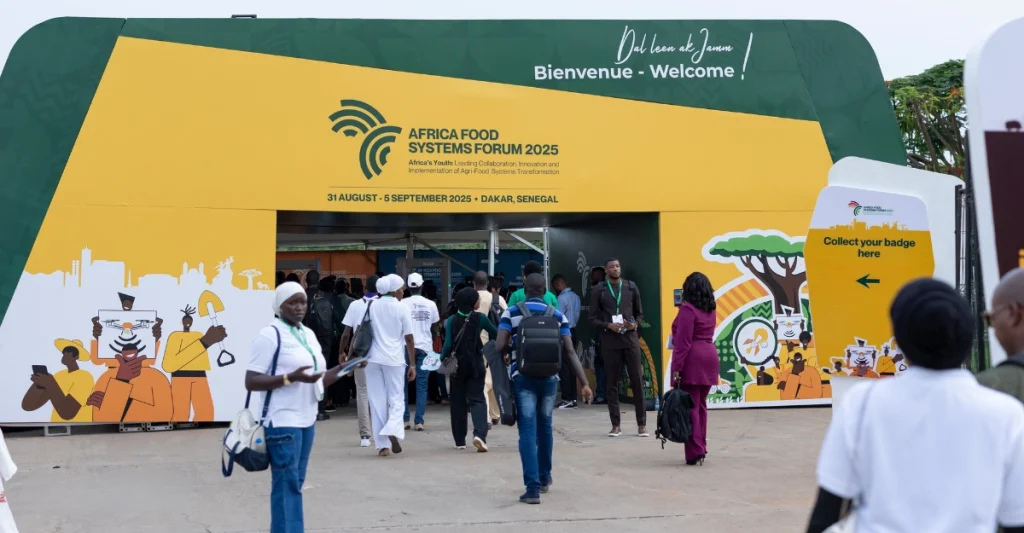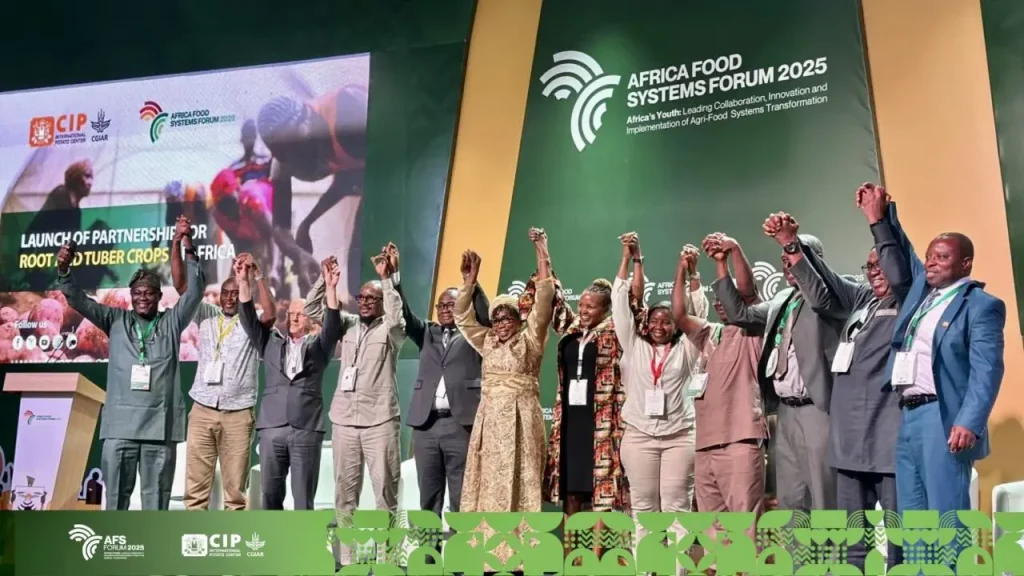Youth Are the Drivers of Africa’s Food Systems Transformation
Agriculture stakeholders have maintained that youth-led innovation and collaboration will drive sustainable food systems transformation across Africa. During the 2025 landmark Africa Food Systems Forum (AFSF), held in Dakar, Senegal, the youths were called to leverage the tools at their disposal to help improve the production of food sufficient for the continent.
The forum brought together public and private sector leaders, policymakers, researchers, development partners, and youth champions to discuss actionable solutions aimed at achieving sustainable, inclusive food systems across the continent. It was hosted under the theme “Africa’s Youth Leading Collaboration, Innovation, and Implementation of Agri-Food Systems Transformation.”

Senegal, known as the “Land of Teranga” or hospitality, has been a stable country and made history by electing Africa’s youngest president, whose vision centers youth participation in food systems transformation. The event emphasized renewing commitment to the Comprehensive Africa Agriculture Development Program (CAADP) and advancing the new Kampala CAADP Strategy, which highlights science, youth inclusion, gender equity, and climate resilience.
Charlotte Hebebrand, Director of Communications and Public Affairs at International Food Policy Research Institute (IFPRI), spotlighted the synergy between CGIAR’s scientific research and the Alliance for a Green Revolution in Africa (AGRA), stressing that coordinated innovation pathways are crucial to support national and regional priorities. She stated, “Sustainable transformation in African agriculture hinges on innovation, youth inclusion and climate-smart practices aligned with the CAADP agenda.”
The forum showcased an innovative marketplace where start-ups and companies displayed groundbreaking technologies spanning digital tools, mechanization and climate-smart agriculture, addressing sectors including inputs, agribusiness, fintech, energy, nutrition, and trade.
John Ulimwengu, a senior research fellow at IFPRI, moderated a plenary on Africa’s progress in transforming food systems. He emphasized the importance of holding stakeholders accountable and investing in those driving change on the ground, particularly youth, women, smallholder farmers and local leaders. He said, “the people closest to the challenges must be at the center of the solutions because real progress depends on their empowerment.”
The launch of the Africa Agriculture Status Report (AASR) highlighted how digital tools and inclusive business models are scaling across Africa to foster data-driven leadership and climate-smart agriculture. Johan Swinnen, Director General of IFPRI, noted that while Africa remains the largest recipient of development funds for food systems, domestic resource mobilization still lags. He asserted, “Scaling sustainable food systems requires innovating financial instruments and strengthening domestic capacities to mobilize resources effectively.”
The forum also explored public-private partnerships to co-develop infrastructure and finance mechanisms, with emphasis on creating bankable, impact-driven investment opportunities. Esther Kimani, CEO and founder of Farmer Lifeline Technologies in Kenya, discussed opportunities for boosting youth engagement in agrifood systems. She said, “Empowering youth through technology and entrepreneurship is essential to building resilient, inclusive food systems that can secure livelihoods and drive innovation.”
Artificial intelligence (AI) emerged as a transformative tool. IFPRI and partners demonstrated AI applications to deliver localized, real-time agricultural advisory services, aiming to increase smallholder farmers’ productivity and profitability.
Jawoo Koo, a senior research fellow at IFPRI, noted, “AI has the potential to bridge information gaps and overcome barriers like language and digital divides but must be governed responsibly to ensure trust and sustainability.”
The dialogue underscored the significance of diversity and inclusion in the food systems transformation agenda. H.E. Jakaya Mrisho Kikwete, the former President of Tanzania, highlighted the Kampala Declaration’s role in advancing inclusion. He observed, “African food systems must embrace diversity and equity, ensuring women and vulnerable groups have equal opportunities to contribute and benefit.” Claudia Ringler, Director of Natural Resources and Resilience at IFPRI, presented advancements in embedding nutrition and social protection within agricultural frameworks, fostering healthier, more equitable outcomes.
The forum featured discussions on harnessing school meal programs as entry points for building resilient food systems by promoting indigenous, climate-resilient crops and empowering women and youth. Such initiatives were identified to have significant impacts on nutrition and local economies. They stressed the importance of climate-smart agriculture and early warning systems to mitigate food system risks exacerbated by climate change. The need for integrated cross-sector approaches involving governments, farmers, private sector and civil society was emphasized.

Alice Ruhweza, President of AGRA, reiterated the need for Africa to transform her food systems for sustainability through collaboration and innovation. She said, “Africa is at a pivotal moment. Transforming its food systems requires bold collaboration, inclusive leadership especially by youth, and innovative financing grounded in practical realities. Together, we can ensure a future of food security, resilience, and prosperity for all Africans.”
The forum highlighted the continent’s rapid progress, ongoing challenges, and shared commitments to drive an inclusive, resilient and sustainable transformation of African food systems. It reaffirmed youth as key drivers of change, with innovative technologies, coordinated policies, and strategic investments paving the way forward.
The event laid down clear pathways where governments, private sector, researchers, and communities can collaboratively implement solutions that ensure food systems benefit everyone across Africa’s diverse landscapes. The legacy of the 2025 forum is a strengthened foundation for collective impact toward Africa’s agricultural and nutritional future.
